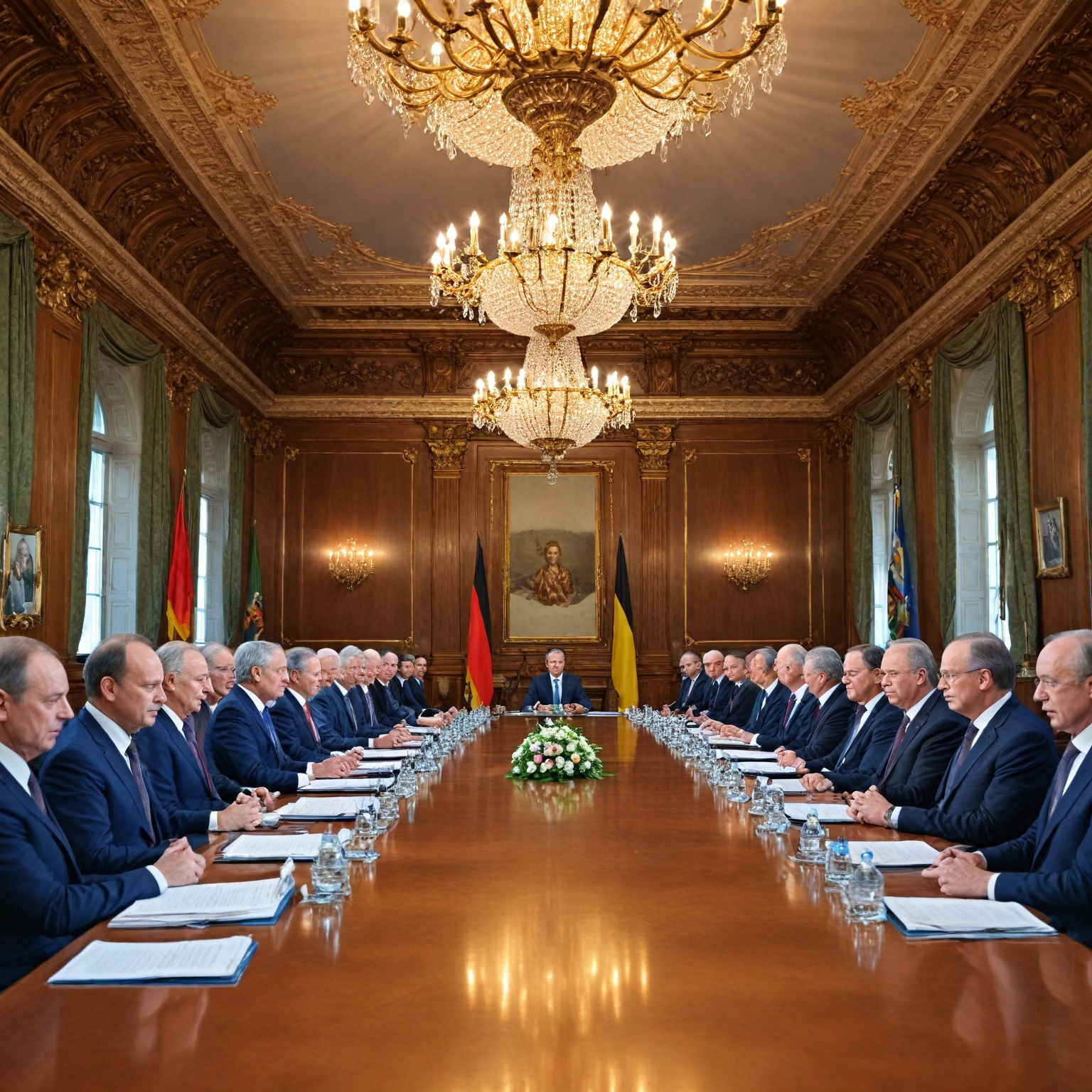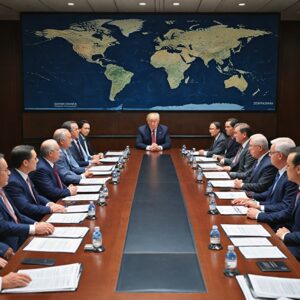Summary
Friedrich Merz, leader of the Christian Democratic Union (CDU), is set to become Germany’s Chancellor following the 2025 federal election, after successfully negotiating a coalition agreement with the Social Democratic Party (SPD). At 69 years old, Merz will be the oldest German chancellor since Konrad Adenauer, marking a significant political shift characterized by his conservative and economically liberal stance. His rise to power reflects both a response to voter concerns over migration and internal security and a desire for economic revitalization amid global uncertainties.
The coalition agreement outlines an ambitious agenda centered on bold reforms and substantial investments, including the creation of a €500 billion “Germany Fund” to finance infrastructure, climate protection, and defense modernization. Key policy priorities include reforming Germany’s constitutional “debt brake” to enable increased borrowing, enhancing defense spending in light of European security challenges, and implementing tax cuts to stimulate economic growth and competitiveness. While committed to Germany’s 2045 climate neutrality target and the 2038 coal phaseout, Merz’s government adopts a more cautious approach to the pace of the green transition, balancing environmental goals with industrial and fiscal considerations.
The coalition’s tougher stance on migration, featuring stricter border controls and measures to curb irregular migration, addresses the rise of the far-right Alternative für Deutschland (AfD) and reflects a broader shift in public sentiment. However, these policies have sparked debate both within the coalition and among opposition parties, alongside concerns about the feasibility of passing constitutional reforms requiring broad parliamentary support amid a fragmented political landscape. The Greens, in particular, have expressed reservations about the adequacy of climate commitments, highlighting ongoing tensions over environmental priorities.
Merz’s government also seeks to reinforce Germany’s international role through strengthened transatlantic ties and closer European defense cooperation, including openness to discussions on nuclear sharing arrangements. As coalition negotiations continue, the administration faces the complex task of balancing ambitious reform with coalition dynamics, public expectations, and geopolitical challenges, setting a pivotal course for Germany’s domestic policy and global engagement in the coming years.
Background
Friedrich Merz emerged as the Christian Democratic Union’s (CDU) candidate for Chancellor of Germany in September 2024, ahead of the 2025 federal election. At 69 years old, Merz would become the oldest person to assume the chancellorship since Konrad Adenauer, who took office at 73 following World War II. Known as a self-described social conservative and economic liberal, Merz has long pursued the position, having spent a decade leading Atlantik-Brücke, an organization dedicated to fostering German-American relations.
Despite his conservative stance, Merz’s approach to climate and economic policies reflects a nuanced position. He has criticized the previous government under Chancellor Olaf Scholz for policies that he describes as “almost exclusively geared towards climate protection,” arguing that such focus has contributed to Germany’s economic challenges. During his campaign, Merz denounced what he called “left and green nutters” but did not propose rolling back Germany’s legally enshrined 2045 climate neutrality target. His party, along with its Bavarian sister party the Christian Social Union (CSU), remains committed to the 2038 coal phaseout target and supports the expansion of renewable energy sources, including wind power, which Merz later acknowledged as necessary despite earlier skepticism.
Following the 2025 election, the CDU/CSU secured the most seats and negotiated a coalition agreement with the Social Democratic Party (SPD), positioning Merz as the projected chancellor from May 6, 2025. However, coalition talks have been complex and prolonged, involving 16 groups and 256 negotiators. Merz has emphasized the importance of thoroughness over speed in these negotiations, acknowledging that significant reforms will be necessary once the coalition is formed. His increasingly populist positioning within the CDU has raised concerns about the party’s ability to maintain centrist coalition partnerships, particularly with the SPD and the Greens.
Coalition Formation
Following the February federal election in which Friedrich Merz’s Christian Democratic Union (CDU) emerged as the strongest party but failed to secure an absolute majority, coalition negotiations became essential to form a stable government. The Social Democratic Party (SPD), led by Lars Klingbeil, engaged in talks with the CDU to explore potential collaboration and ultimately reached a coalition agreement after weeks of intensive negotiations.
The coalition deal, approved by the CDU delegates and submitted to the SPD’s more than 358,000 members for ratification, sets forth a comprehensive agenda focused on economic growth, increased defense spending, and significant modernization efforts to address Germany’s long-neglected infrastructure needs. The agreement notably includes reforms to Germany’s strict debt rules, enabling the government to allocate substantial investment toward the military and infrastructure projects.
A central element of the coalition’s platform is a tougher stance on migration, reflecting voter concerns from the election. The deal outlines measures aimed at “controlling and largely ending irregular migration” through stricter border controls, including the rejection of asylum seekers at national borders, a suspension of family reunification, and an expansion of the list of countries deemed safe origins for asylum claims. While these provisions mark a harder line, SPD leaders emphasize that the agreement maintains Germany’s fundamental right to asylum and preserves its status as a country of immigration.
Merz’s government also plans to enhance Germany’s price competitiveness by implementing tax cuts and incentives for investment. This includes a gradual reduction of corporate income tax by one percent annually over five years starting in 2028. The coalition agreement, finalized just 45 days after the election, represents a relatively swift resolution by German standards, where postelection negotiations often extend over several months.
The coalition faces the final hurdle of parliamentary approval to enable the election of Merz as chancellor, with the SPD membership vote playing a crucial role in the process. The new government is set to assume office amid a backdrop of global economic uncertainty and escalating trade tensions, underscoring the urgency of its ambitious reform agenda.
Policy Reforms
The coalition government led by Chancellor Friedrich Merz has announced a comprehensive set of policy reforms focused on economic growth, military strengthening, climate action, and regulatory changes. Central to the government’s agenda is a significant increase in defence spending, addressing critical shortages in ammunition, personnel, and infrastructure within Germany’s armed forces. This shift includes reforming the country’s strict debt rules, enabling large-scale investments into the military and crumbling infrastructure, a move that was met with mixed reactions from political parties and commentators alike.
Economically, the coalition plans to stimulate growth by cutting taxes for middle and lower incomes, reducing corporate tax gradually starting in 2028, and lowering energy prices through measures such as reducing the electricity tax to the European minimum and cutting grid fees. These tax reforms are intended to enhance Germany’s price competitiveness and encourage investment in new equipment. The government also seeks to streamline financial regulations, including reforms to reduce capital requirements for infrastructure projects and expedite state aid procedures. A new “Germany Fund” has been proposed to mobilize funds for investment, further supporting innovation and economic modernization.
The coalition has committed to reforming the constitutionally enshrined “debt brake,” which critics argue has constrained economic growth. Plans include establishing a commission to evaluate further changes, highlighting the government’s recognition of the need for fiscal flexibility amid looming economic challenges such as a trade shock and the risk of recession.
Climate policy remains a key aspect of the coalition’s agenda, albeit with compromises reflecting Merz’s conservative stance. While Merz has criticized previous governments’ climate policies and opposed the EU’s proposed 2035 ban on combustion vehicles, the coalition agreement includes a commitment to Germany’s 2045 climate neutrality target and the 2038 coal phaseout date. Importantly, €100 billion from the new infrastructure fund will be allocated to the Climate and Transformation Fund (KTF) to support climate protection and the transition to renewable energy. This allocation was crucial in securing the support of the Greens for the coalition and necessary constitutional changes regarding borrowing rules.
The coalition also promises extensive support for the automotive sector, particularly electric mobility, as part of Germany’s broader push toward a cleaner economy. However, skepticism remains from Merz and some conservatives about rapid shifts such as hydrogen-powered steel production, reflecting ongoing debates about the pace and nature of Germany’s green transition.
In the area of security and international relations, the government aims to strengthen transatlantic ties and foster closer European defense cooperation. Merz has signaled openness to discussions with nuclear powers such as the UK and France on potential nuclear sharing arrangements, illustrating a strategic approach to Germany’s role in European security amidst rising global tensions.
Investment Plans
The coalition government under Chancellor Merz has unveiled an ambitious investment programme aimed at revitalizing Germany’s economy and addressing critical infrastructure needs. Central to this plan is the establishment of a new “Germany Fund,” a €500 billion investment vehicle designed to support infrastructure development, climate goals, and defense modernization. The fund will finance a broad array of projects, including infrastructure upgrades, renewable energy expansion, and measures to strengthen national security.
A significant portion of the fund—€100 billion—is specifically allocated to achieving climate neutrality by 2045, with investments targeting the transition to renewable energy and the modernization of local infrastructure such as district heating networks. The coalition agreement also increases borrowing capacity for Germany’s federal states by €16 billion, enabling regional governments to pursue their own infrastructure and energy projects aligned with national climate objectives. This focus on green investment responds to earlier criticism from the Greens, who had expressed concern that climate commitments were insufficient in the original proposals.
In addition to environmental priorities, the investment plans include substantial support for Germany’s automotive industry, particularly to accelerate the shift toward electric mobility and cleaner transportation technologies. However, Merz has publicly opposed the EU’s proposed ban on combustion engine vehicles by 2035, advocating instead for technological innovation rather than outright bans as the path to a sustainable green transition.
Defense spending is another cornerstone of the coalition’s investment strategy. Against the backdrop of heightened European security challenges and strained transatlantic relations, the government has committed to significantly increasing military expenditure. This is facilitated by reforms to Germany’s constitutional “debt brake,” which now permits borrowing beyond previous limits specifically for defense spending exceeding 1% of GDP. These measures aim to address critical shortages in military equipment and infrastructure, as highlighted by Germany’s armed forces commissioner, and to strengthen the country’s strategic autonomy.
The coalition’s investment agenda also encompasses social and border security policies, with commitments to “control and largely end irregular migration” and implement stricter border controls—issues that were pivotal in the recent federal election. Economists predict that the infrastructure fund could boost German economic output by more than two percentage points annually over the next decade, underscoring the programme’s potential impact on reversing recent economic contractions and fostering sustained growth.
Political Ideology and Priorities
Friedrich Merz’s political ideology reflects a conservative and economically liberal stance with a strong emphasis on national security, economic reform, and migration control. Often described as a “solid Ronald Reagan type,” Merz represents a break from the cautious, consensus-driven leadership style that characterized recent German chancellors such as Angela Merkel and Olaf Scholz. His approach is marked by a willingness to pursue bold and sometimes controversial policies, including a self-described “all-in” migration U-turn aimed at addressing voter concerns over immigration and internal security.
A central priority for Merz is to restore Germany’s economic strength and stability through substantial reforms and investments. His coalition’s manifesto outlines ambitious plans to mobilize funds via a new “Germany Fund,” with reforms designed to reduce capital requirements for infrastructure projects and streamline state aid procedures. Merz also pledges extensive support for Germany’s automotive industry, promoting electric mobility as part of a broader transition to a cleaner economy. These initiatives are intended to foster innovation and economic growth while ensuring Germany remains competitive on the global stage.
National security occupies a prominent place in Merz’s agenda, especially in the context of heightened geopolitical tensions in Europe. He emphasizes Germany’s role in European unity and the transatlantic alliance, underscoring the importance of defense cooperation amid challenges posed by Russia’s war in Ukraine and strained transatlantic relations. Energy security is framed as a key component of national security, with calls for centralized investment in energy independence to safeguard Germany’s economic resilience and strategic autonomy.
Merz’s government is also focused on constitutional reforms to enable increased military spending and infrastructure investment, with a goal to pass amendments before the new parliament convenes in late March to prevent obstruction by parties opposed to such measures. His stance on migration and internal security aims to counter the rise of the far-right Alternative für Deutschland (AfD), whose increasing electoral support has prompted the government to propose tough border controls and measures to control irregular migration.
Public and Political Reactions
The announcement of Chancellor-in-waiting Friedrich Merz’s coalition agreements and proposed reforms elicited a range of responses from political figures and the public. Minister-President of Saxony, Michael Kretschmer (CDU), emphasized that refusing cross-party cooperation on substantive local decisions was unsustainable in a democracy, signaling the need for pragmatic collaboration despite ideological differences. Meanwhile, Merz himself retracted his 2018 promise to halve the influence of the far-right Alternative for Germany (AfD), explaining that the opposition party could not achieve this goal if the government’s own policies inadvertently strengthened the AfD’s position.
Merz’s coalition deal came after intense negotiations with the Social Democratic Party (SPD), underscored by the AfD’s surprising surge into second place in the February elections, highlighting a shifting political landscape that added urgency to the formation of a stable government. Merz pledged that the government would address the issues that facilitated the rise of the AfD, particularly through tough reforms on migration and internal security designed to tackle voters’ concerns. These measures included controlling irregular migration and imposing stricter border controls, which Merz defended as necessary actions to restore government control over migration policy.
However, the coalition’s plans did not go unchallenged. The Greens criticized the government’s climate and energy transition commitments as insufficient, warning that proposed funds might be diverted to fulfill electoral promises instead of supporting essential long-term investments. Their influence in the Bundesrat, Germany’s council of federal states, was viewed as a critical factor for the plan’s success. This dynamic underscored the complex balancing act Merz faces, as green initiatives resonate strongly not only with the Greens but also with voters from the SPD and the Left Party, who collectively represent a significant portion of the electorate.
Beyond domestic politics, Merz’s approach reflected broader geopolitical concerns. He openly expressed skepticism about the United States’ commitment to Europe, suggesting that the current American administration did not prioritize Europe’s fate. This stance was highlighted during his joint press conference with coalition partners, where Merz addressed the escalating trade tensions instigated by U.S. import tariffs and reaffirmed Germany’s commitment to a strong European and transatlantic alliance, even as he signaled a need for more autonomous economic and security policies.
In sum, public and political reactions to Merz’s coalition agreement and reform agenda reveal a landscape marked by both support for decisive action against right-wing extremism and migration challenges, and significant demands for stronger climate policies and sustainable investment. The coalition’s ability to navigate these competing pressures will be pivotal for the government’s stability and effectiveness moving forward.
Challenges and Criticisms
Friedrich Merz’s ambitious reform and investment plans have encountered significant challenges and criticisms from various political actors and factions. One central issue is the political complexity of reforming Germany’s constitutionally enshrined spending limits, known as the “debt brake.” Changing these borrowing rules requires a two-thirds majority in parliament, necessitating cooperation not only between the CDU/CSU and SPD but also support from parties such as the Left Party or the far-right Alternative für Deutschland (AfD), which presents a formidable hurdle given the polarized political landscape.
Merz’s shift in fiscal policy has already sparked concern among some conservatives and coalition partners. His acknowledgment that his party, while in opposition
Future Outlook
Chancellor-elect Merz has articulated a vision for Germany focused on restoring the country’s strength, stability, and economic resilience. He emphasized the government’s commitment to implement extensive reforms and investments aimed at securing Germany’s future, stating that the coalition will work to make the nation “more secure and make it economically stronger again”. Central to this vision are measures addressing internal security and migration, designed to counter the rise of the far-right Alternative für Deutschland (AfD), which recently topped national voting intention polls for the first time.
The coalition’s reform agenda includes significant financial and constitutional measures intended to unlock investment in infrastructure and military spending. Recent amendments to Germany’s strict debt rules facilitate substantial borrowing for modernization efforts, particularly in defense and infrastructure, with a focus on energy independence and strategic autonomy. These constitutional changes are aimed to be passed swiftly before the newly elected parliament convenes to avoid potential blockage by opposition parties. The constitutional court has already dismissed complaints against these reforms, clearing a major hurdle for their implementation.
Economically, Merz has criticized the previous government’s focus on climate protection as overly dominant and has pledged a shift toward a more balanced approach that supports industrial innovation and economic growth. Among the planned initiatives is the creation of a “Germany Fund” to mobilize investment capital, as well as regulatory reforms designed to accelerate state aid procedures and reduce capital requirements for infrastructure projects. Support for the automotive sector, particularly electric mobility, is a key component of the government’s push toward a cleaner economy.
On the international stage, Merz has reaffirmed Germany’s role as a key player in Europe and the transatlantic alliance. He envisions an invigorated Franco-German partnership and closer European defense cooperation as essential to maintaining security and economic strength amid shifting geopolitical dynamics. His willingness to provide greater leadership reflects recognition of Germany’s strategic position in the heart of Europe and the necessity of adapting to new security realities.
Despite these ambitions, coalition negotiations remain complex, involving multiple parties and extensive deliberations. Merz has prioritized thoroughness over speed in finalizing agreements, acknowledging that substantial reforms require careful consensus-building. Nonetheless, the coalition’s outlined agenda sets a bold course for Germany’s future, focusing on stability, security, innovation, and renewed international engagement.
The content is provided by Sierra Knightley, Fact-Nest













